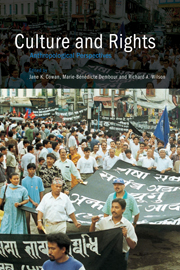Book contents
- Frontmatter
- Contents
- List of contributors
- Preface
- 1 Introduction
- Part I Setting universal rights
- Part II Claiming cultural rights
- 7 Ambiguities of an emancipatory discourse: the making of a Macedonian minority in Greece
- 8 From group rights to individual rights and back: Nepalese struggles over culture and equality
- 9 Advancing indigenous claims through the law: reflections on the Guatemalan peace process
- 10 Rights as the reward for simulated cultural sameness: the Innu in the Canadian colonial context
- Index
10 - Rights as the reward for simulated cultural sameness: the Innu in the Canadian colonial context
Published online by Cambridge University Press: 05 June 2012
- Frontmatter
- Contents
- List of contributors
- Preface
- 1 Introduction
- Part I Setting universal rights
- Part II Claiming cultural rights
- 7 Ambiguities of an emancipatory discourse: the making of a Macedonian minority in Greece
- 8 From group rights to individual rights and back: Nepalese struggles over culture and equality
- 9 Advancing indigenous claims through the law: reflections on the Guatemalan peace process
- 10 Rights as the reward for simulated cultural sameness: the Innu in the Canadian colonial context
- Index
Summary
Introduction
It is only relatively recently that nation-states have concerned themselves with explicating the nature of the ‘rights’ of various indigenous, ethnic and minority groups, both internationally and within their borders. This concern for the human and other rights of peoples around the world has largely occurred in the era following formal decolonization. There was little attention given to such issues by European or other states during the height of European expansion, and it has only been in the wake of the Second World War with the legacy of a European holocaust, that such concerns attained international prominence with the adoption of the Universal Declaration of Human Rights in 1948. Since then, a host of international bodies, Non Governmental Organisations (NGOs) and academics have begun seriously to confront the problems that surround the recognition, protection and abuse of rights.
Because political discussions and academic debates over the nature and content of these rights occur in what is generally regarded as a post-colonial era, there has been little thought given to two important dimensions of rights struggles: the persistence of colonialism in many areas of the world, and the nature of cultural difference in regard to the extension of rights. Colonialism, if it is considered at all, is treated as a historical backdrop to the more pressing business of engaging in largely academic debates.
- Type
- Chapter
- Information
- Culture and RightsAnthropological Perspectives, pp. 226 - 248Publisher: Cambridge University PressPrint publication year: 2001
- 12
- Cited by

